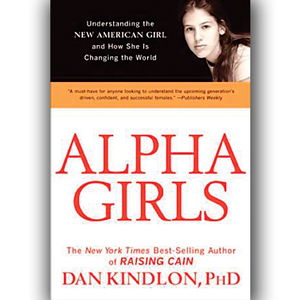
Alpha Girls – Alphas in Love
 I think one of the hardest parts of parenting daughters is encouraging them down career paths they are passionate about all the while knowing they’ll face tough choices when it comes to balancing their careers with motherhood. I realize this may be stereotypical of me. If I had a son, I’m not sure I would be so cognizant of this, largely because men do not have the biological clocks women do. Granted, more and more men are opting to take an intermission from their careers to parent part-or full-time; however, should they want to start a family later in life it’s less of a gamble for them.
I think one of the hardest parts of parenting daughters is encouraging them down career paths they are passionate about all the while knowing they’ll face tough choices when it comes to balancing their careers with motherhood. I realize this may be stereotypical of me. If I had a son, I’m not sure I would be so cognizant of this, largely because men do not have the biological clocks women do. Granted, more and more men are opting to take an intermission from their careers to parent part-or full-time; however, should they want to start a family later in life it’s less of a gamble for them.
Therefore, I took particular interest in Dan Kindlon’s chapter on “Alphas in Love,” especially because I’m troubled by the Superwoman Mystique. When I read Courtney E. Martin’s recent post in the New York Times: Room for Debate – Feminism’s Next Act, I felt she’d captured my generation perfectly when she wrote, “A generation of girls was told that they could be anything, but heard that they had to be everything.” Is this what my daughters are up against?
According to Kindlon, “As ambitious as alphas are as a group, many of them realized that they’ll be faced with tough choices if they want to get married or have kids.” While the alpha generation might not feel the need to compromise as previous generations have, Kindlon reassures readers, “If members of the alpha generation choose to stop working when they have kids it will be a choice, not a necessity that has been forced upon them.” I find this encouraging because I can already see how workplaces are transforming and technology, namely the ability to work virtually, favors whichever parent chooses to slow-down their career to have a family.
Interestingly, Kindlon reports, “Alpha girls are nearly unanimous in agreeing that having a good marriage and family someday is extremely important to them.” In fact, he explains, it is more important to them than non-alpha girls. I found this interesting; however, Kindlon attirbutes some of this to the alpha girl’s positive relationship with her father. While you might expect that alpha girls would voice a desire to delay motherhood, Kindlon explains some only want to wait until their late twenties or early thirties. “They cited studies that had shown that it was harder for women to become pregnant as they aged and that the risk of health problems for both mother and child increased as women got older.”
Granted, Kindlon acknowledges, “The ease with which some alphas may be willing to give up the careers and independence that feminists fought so hard to make possible for them is a new phenomenon.” This is happening, in part, because of a family-centric value system. Kindlon argues that there has been a downward trend in terms of career ambition. “Large numbers of men and women are working hard, but they don’t want the trade-offs they would have to make by advancing into jobs with more responsibility.
Still, I think it speaks well for alpha girls, as one of their most notable characteristics is the desire to be successful enough to provide for herself; she doesn’t want to have to rely on a partner. Kindlon claims, “Some alphas may choose to be part of the trend of single-parenting that is catching on among educated women.” Kindlon is careful to clarify that alpha girls are not anti-family; rather they simply aren’t as interested in “maintaining the institution of marriage as it has traditionally played itself out.”
Therefore, I can’t help but think the trends illuminated in Alpha Girls by Dan Kindlon raise another issue. If alpha girls harbor the potential to change the world, how do we raise a generation of boys to be their partners, both professionally and personally, in this progress?
Follow @WinterhalterV on Twitter for updates on blog posts or like Parenting by the Book on Facebook.
Read my other blog Befriending Forty.






